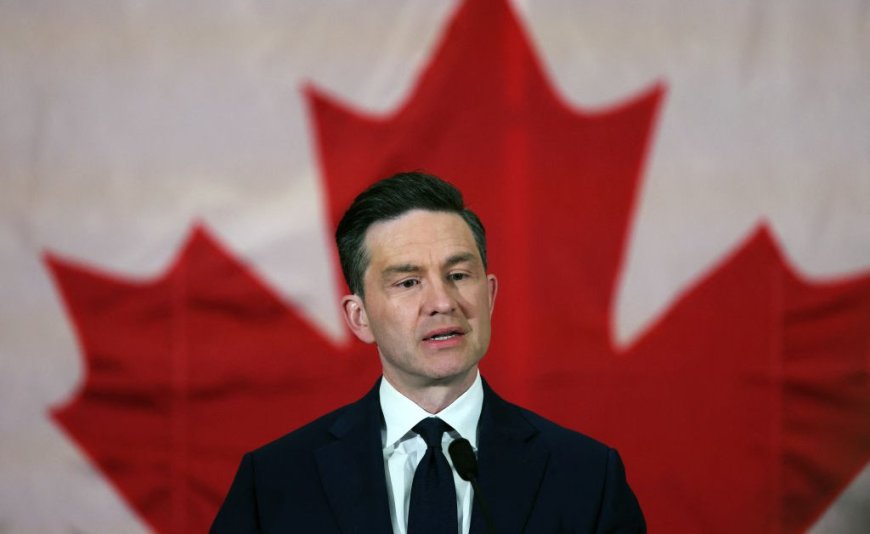Canada Will Soon Get a Trump-Like Leader
The Trump-like Conservative leader is riding an anti-establishment wave—and will almost certainly become Prime Minister this year.


On Monday, Canadian Prime Minister Justin Trudeau announced his resignation to avoid a revolt from his Liberal lawmakers amid over a year of disastrous polling. Parliament is now suspended until March and Trudeau will stay on until the Liberals pick a new leader. But while the country is entering a brief period of limbo, one thing is all but certain. [time-brightcove not-tgx=”true”]
A man who has drawn comparisons to Donald Trump will become Canada’s Prime Minister.
Pierre Poilievre, the leader of the opposition Conservative Party, is on track to decisively win an election expected this Spring and bring the Trudeau era to an end. The Conservatives are up by more than 20 points in the polls, amid deep anger over the cost-of-living crisis and other issues that have recently toppled incumbents across the West.
: How Canada Fell Out of Love With Trudeau
Should Poilievre win his expected majority in Parliament, he will have the run of the joint. Canadian Prime Ministers are famously—or infamously—powerful in such situations.
No Canadian Prime Minister is an absolute monarch—they face modest restraints from their caucus, the courts, opposition in the House of Commons, the Senate, interest groups, and the people of Canada themselves—but in practice they can get away with an awful lot between elections. The Westminster “whip system” is unique for its strength and it means that Poilievre will have at least four years in which his soldiers are lined up firmly behind him—just as Trudeau once did. He’ll enjoy that power as long as he remains popular—just as Trudeau once did.
Poilievre is a bare-knuckle brawler of a politician who means what he says and says what he believes to be true. He’s a lifelong conservative, a true believer, and a deep ideologue in the make and mold of the Reagan era. He’s committed to a 1980s-style tough on crime program, the sort that’s proven time and again to fail. He’s doubtless about the power of the free market and utterly committed to restraining government—cutting costs, taxes, and letting capitalism do its thing, convinced of the Gipper’s adage that government isn’t the solution, it’s the problem. In that sense, Canadians can expect Poilievre to slash taxes, regulations, and, perhaps, social programs. He hasn’t committed to keeping popular Trudeau-era social programs, including a free dental care plan and a budding prescription drug care one.
The 45-year-old Poilievre has been an elected politician his entire career. But he has carefully cultivated an outsider narrative. He has a boxer’s demeanour. There are echoes of the far right in his war cries. He attacks journalists, gets the facts wrong in the service of over-the-top rhetoric, and flirts with extremists. He’s not shy about bounding into the growing fronts of the culture wars, including the pushback against trans rights. He has something of an extremely-online alt-right YouTuber about him, a kind of smarmy and self-satisfied certainty, which is as disconcerting as it is fitting for the times.
But there’s more to Poilievre than just that.
Since becoming Conservative Party leader, he has focused on affordability issues that are a top voter concern, courting the working class in the process. It’s a strategy that’s been a smashing success at a time when the country is indeed making its way through a protracted cost-of-living crisis driven by the lingering effects of the pandemic, high—though falling—interest rates, Russia’s war in Ukraine, and a Trudeau carbon tax.
With a pocketbook-first agenda and an angry-everyman demeanour, Poilievre has managed to become the man for the moment. But Poilievre’s brash style will mean that Canada—a country with a reputation for “nice” people and nice politics—may increasingly look like the toxic partisanship seen everywhere that the Donald Trump era has exacerbated to the extreme in the U.S.
For now, though, Poilievre’s discipline in focusing on economic issues has paid off. He’s been wise to show up where voters tend to be, speaking to them in ways that resonate, reflecting back the anger and frustration so many people feel as they struggle to afford groceries and rent or mortgage payments, as they worry if their jobs will remain secure and sufficient, or as they wait months to see a doctor, if they can find one. He’s an angry man, but it’s an angry time.
That anger is Poilievre’s ally today, but tomorrow it could be his enemy—and the source of his downfall. If he wins and fails to get a grip on the issues Canadians care most about, he may find himself sharing Trudeau’s fate before long, as so many of his predecessors have.


























































